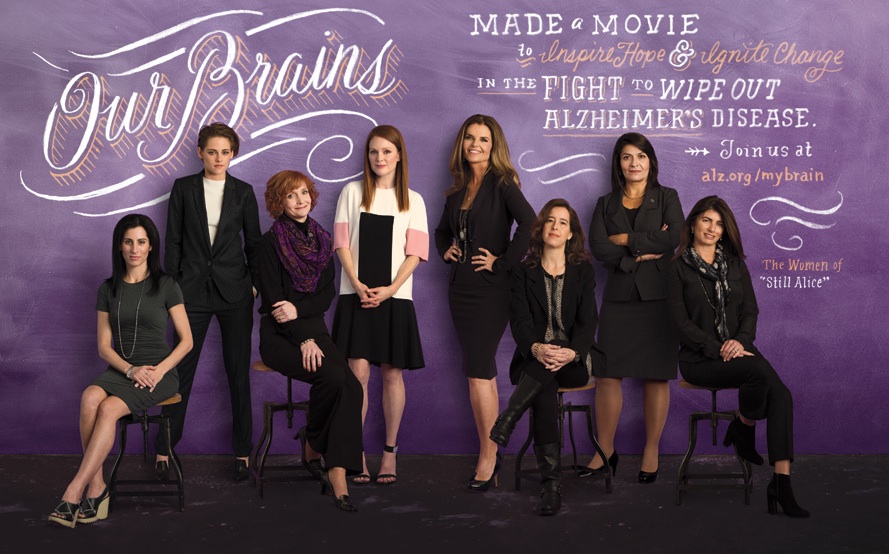“I’m so happy (thrilled actually) that we were able to shine a light on Alzheimer’s Disease. So many people with this disease feel isolated and marginalized, and one of the wonderful things about movies is that it makes us feel seen and not alone. And, people with Alzheimer’s deserve to be seen so that we can find a cure.”
This film is epically pivotal for people who have not had experience (yet) with the disease nor comprehend the devastation it encompasses. Hollywood found the perfect advocate to raise awareness in Julianne Moore, who played an Early-onset Alzheimer’s victim in Still Alice. Here is a brief synopsis:
Dr. Alice Howland (Julianne Moore), a distinguished professor of linguistics at Columbia University, mother of three grown children, and wife to John Howland (Alec Baldwin) learns that she is suffering from early-onset Alzheimer's disease. After discovering it was genetically inherited from her father, her children test themselves to see if the disease has been passed to them. The eldest daughter, Anna, tests positive. Her youngest daughter, Lydia (Kristen Stewart), decides not to be tested.
Many people assume Alzheimer’s only affects old people, which is far from true. Of over 5 million people suffering from Alzheimer’s in the US, 5 percent have one of two forms of Early-onset Alzheimer’s (as opposed to Late-onset at age 65 or older). These victims show initial signs of deterioration as early as their 50s, 40s, and in rare cases, their 30s when many are at the peak of their professions.
Three versions of Alzheimer’s Disease includes Early-onset (EOAD), Familial Early-onset (eFAD), and (sporadic) Late-onset (LOAD).The type of Early-onset AD affecting Julianne Moore’s character is the familial form, which is genetically passed down from a parent. When you have the gene responsible for the disease, nothing can be done to cure, prevent or slow down the progress at this time; however, there are people working hard to find answers. The DIAN (Dominantly Inherited Alzheimer’s Network) Project is funded through NIA (National Institute on Aging) and is making great research strides in St. Louis through the Knight Alzheimer’s Disease Research Center in affiliation with Washington University.
IF YOU HAVE A BRAIN, YOU ARE AT RISK! Educate yourself about how the two categories of genes influence whether a person develops a disease: (1) risk genes and (2) deterministic genes. Click below for more information:
http://www.alz.org/research/science/alzheimers_disease_causes.asp#genetics
In IF MUSIC BE THE FOOD OF LOVE, I also tackled early-onset and the despair of losing everything when the character barely had a chance to live. As poignantly depicted by Julianne Moore’s character in Still Alice, even the brightest are at risk and the most educated and busiest tend to deteriorate faster.
This movie may not be the most popular selection to watch, but it is the most important film to see right now. As Julianne eloquently stated, I also hope to shine a light on one of the most profound epidemics in our world, and sadly, one of the most underfunded. Awareness is the uphill battle we continue to promote, and I pray all our children and their descendants have a chance to live in a world without Alzheimer’s Disease.


 RSS Feed
RSS Feed